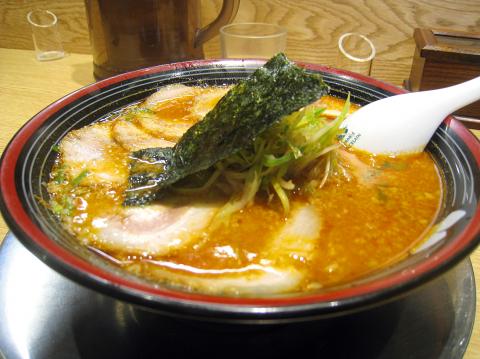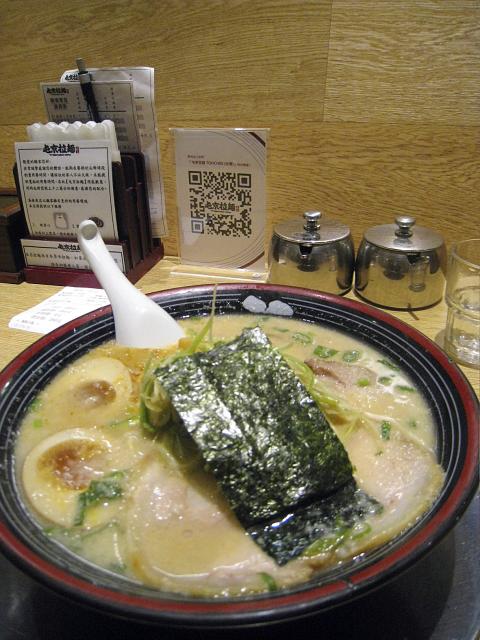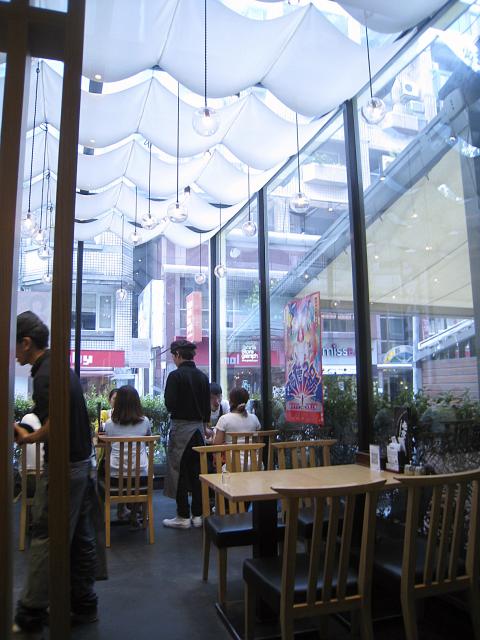Yet another foray in the ramen invasion of Taipei, Tonchin Ramen (屯京拉麵) purports to provide authentic ramen not just from Tokyo, but from the Ikebukuro district of that city.
Ikebukuro is a commercial and entertainment district, and the ramen that Tonchin serves up is quite a performance. I had been told that it was the polar opposite of Enishi Ramen (麵屋緣, reviewed in the Taipei Times on July 20, p12), which serves Kyoto style ramen, and that it would be hard to find two establishments serving the same food with such different presentation and ambiance.
Whereas Enishi is stripped down and understated, Tonchin has a big, high-ceilinged glass dining area, a slate-tiled stairway, a roped-off entry and exit lanes to manage the press of people. Although already an established presence, a lunchtime visit had a queue running down to the street.

Photo: Ian Bartholomew, Taipei Times
Despite the crowds, the service was efficient, and those waiting in line in the blistering summer heat were handed glasses of chilled water and paper fans to make the wait more bearable. A subsequent afternoon visit just after 4pm proved that Tonchin could remain three-quarters full even at this unfashionable time.
There is a huge picture menu that offers a wide number of variations on what is actually quite a small number of main dishes. The menu is an explosion of color, and it is easy to become overwhelmed by what seems a multitude of choice.
Exploration of what was on offer began with the super-value Tokyo-style pork ramen (NT$260), which packed an amazing amount of flavor and texture into a single bowl. There was sliced pork, preserved bamboo shoots, a chiffonade of spring onions, two egg halves, kombu and probably much more that could not be sorted from the ostentatious pile atop the bowl. Then there are the noodles, which are made with the unusual inclusion of fish powder into the dough, giving the strands a depth of flavor independent of the broth. This broth was also rich in flavor, with multiple layers revealing themselves as you got to grips with the dish. Screens above the service counter showed a short video about the making of the noodles and the broth, and highlighted the ceaseless crowds that cram Tonchin’s Tokyo outlets night and day.

Photo: Ian Bartholomew, Taipei Times
The super-value Tokyo-style pork ramen was good, but it was nothing you would write home about. It ticked all the right boxes for variety of flavor and texture, but there are other places in town that could meet it point for point.
The spicy Tokyo-style broth with caramelized onions (NT$260) was quite a different proposition, and had the kind of impact, if you like spicy food, that gets people coming back for second and third visits. The secret is that it is not super spicy, but generates a gentle slow burn in the gullet that seems particularly soothing in the hot weather. Ordered in the version with additional roast pork (NT$270), it is a meaty, fishy, spicy, salty, bowl of ramen heaven. Well-chilled water is available on the service counter, helping to wash down the heavily-flavored dish.
Servers ask whether you want a medium or large portion of noodles when you order. (Both are the same price.) Portions are generous and a medium serving is probably sufficient for all but the heartiest eaters.

Photo: Ian Bartholomew, Taipei Times
Servers also warn that the restaurant will not do takeout for unfinished noodle dishes.
A number of side dishes are available, ranging from cold tofu to western-style salads (NT$80), but none looked particularly appealing. Almost irresistible though were the deep-fried chicken pieces (NT$180), which are incredibly crunchy and moist, and almost worth the high price, and together with a bowl of noodles, make a blowout meal for one.
As the ramen invasion continues, Tonchin looks like it has already established its beachhead. Get in early or be prepared to wait in line.

On April 26, The Lancet published a letter from two doctors at Taichung-based China Medical University Hospital (CMUH) warning that “Taiwan’s Health Care System is on the Brink of Collapse.” The authors said that “Years of policy inaction and mismanagement of resources have led to the National Health Insurance system operating under unsustainable conditions.” The pushback was immediate. Errors in the paper were quickly identified and publicized, to discredit the authors (the hospital apologized). CNA reported that CMUH said the letter described Taiwan in 2021 as having 62 nurses per 10,000 people, when the correct number was 78 nurses per 10,000

As we live longer, our risk of cognitive impairment is increasing. How can we delay the onset of symptoms? Do we have to give up every indulgence or can small changes make a difference? We asked neurologists for tips on how to keep our brains healthy for life. TAKE CARE OF YOUR HEALTH “All of the sensible things that apply to bodily health apply to brain health,” says Suzanne O’Sullivan, a consultant in neurology at the National Hospital for Neurology and Neurosurgery in London, and the author of The Age of Diagnosis. “When you’re 20, you can get away with absolute

May 5 to May 11 What started out as friction between Taiwanese students at Taichung First High School and a Japanese head cook escalated dramatically over the first two weeks of May 1927. It began on April 30 when the cook’s wife knew that lotus starch used in that night’s dinner had rat feces in it, but failed to inform staff until the meal was already prepared. The students believed that her silence was intentional, and filed a complaint. The school’s Japanese administrators sided with the cook’s family, dismissing the students as troublemakers and clamping down on their freedoms — with

As Donald Trump’s executive order in March led to the shuttering of Voice of America (VOA) — the global broadcaster whose roots date back to the fight against Nazi propaganda — he quickly attracted support from figures not used to aligning themselves with any US administration. Trump had ordered the US Agency for Global Media, the federal agency that funds VOA and other groups promoting independent journalism overseas, to be “eliminated to the maximum extent consistent with applicable law.” The decision suddenly halted programming in 49 languages to more than 425 million people. In Moscow, Margarita Simonyan, the hardline editor-in-chief of the